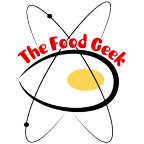In any field involving a creative endeavor, people who make things up have this dream of making money off of it. And ideas, once exposed to the world, are pretty easy to look at and recreate. Physical objects, by and large, require at least as much money to recreate as they did to make in the first place, so people aren't
as worried about individuals copying those as people are about individuals copying ideas.
This fear manifests itself in cooking in a couple of ways. The first is the "secret family recipe." Passed down from generation to generation, there's some trick that someone came up with that makes a better biscuit, a tastier tart, or a moister muffin, and the only time someone gets to experience it is when they visit you. They'll coo, "Wow, what's in this muffin? It' so moist! Like pudding!" and you'll smile and nod and say, "Secret family recipe." Your guests will nod knowingly and ply you with liquor until you talk or pass out, at which point they'll raid your recipe bin.
The second way this manifests itself is when someone in the food creation profession comes up with an idea or a recipe and wants to ensure that they are the only one who does this. In the case of recipe makers, it is often that its copyrighted in a magazine or book, and if you try to republish it or make modifications of it, they threaten you with a lawsuit. In the case of a professional chef, they may come up with some ingredient combination or technique that they don't want other people to copy, so people will be forced to go to their restaurant.
Personally, I think all of those manifestations are foolish. The least foolish is the secret family recipe, because you at least have some family traditions locked up in that, and there are potentially emotional issues or family obligations. Perhaps there is also the ability to win year after year at the county fair, and your great-gradmother's ghost would haunt you forever were a rival family to win with your recipe. I can understand that to a point. I don't follow it myself, but I can understand it.
For commercial endeavors, it's entirely foolish. Nobody is going to go to your restaurant because you're the only person who is allowed to
sous vide bananas and cloves into a pudding. They'll go to your restaurant because you are really good at what you do, and your banana clove pudding is merely a representation of that.
For the recipe publishers, there are certain legal rights and limits that you get for recipes. The US Copyright Office has this to say about
copyrighting recipes:
Mere listings of ingredients as in recipes, formulas, compounds, or prescriptions are not subject to copyright protection. However, when a recipe or formula is accompanied by substantial literary expression in the form of an explanation or directions, or when there is a combination of recipes, as in a cookbook, there may be a basis for copyright protection.
So: The recipe itself is not copyrightable. The words that you use to describe the recipe are. Therefore, if someone includes a little anecdote about how they came about this recipe, or a mnemonic to help you remember the order that the ingredients are put in, or just some Shakespearean phrasing that makes tears well up in the eye whenever you glance over ingredients list, then you can't just copy that and paste it into your web site and expect it to be okay.
However, if you grab the ingredients, re-write the directions in your own words, and add your own value to the recipe, you can take from anywhere, as long as you don't take a significant portion of recipes from any given source.*
Ideas are better shared than they are stored. Ideas like company. Ideas like new environments. Ideas like to frolic in new brains with other ideas. It's how baby ideas are made. Ideas can't reproduce well alone, so everyone wins if ideas are allowed to be promiscuous. Except maybe Mrs. Ideas, who is a little jealous. Still, it's for the greater good.**
How firmly do I believe in this? I have released all of my original work for this site under a Creative Commons License. Specifically:
 The Food Geek
The Food Geek by
Brian J. Geiger is licensed under a
Creative Commons Attribution 3.0 United States License.
Permissions beyond the scope of this license may be available at
/about.
If I have a recipe or an article you like, and you want to put it on your site or in your book or read it on your podcast or whatever, go for it. Just be sure to tell people where it came from. More details are on
the about page.
You might not want to take the pictures, though, as chances are better than even that they are stock and not my own. Sorry. You could ask, though, and I can tell you if they are stock.
In any case, don't be afraid to re-purpose recipes. Even if you don't change the ingredients or preparation directions, you can still make them yours with a little work. Mind you, if you don't add any value, it's probably not worth re-purposing, but collecting best-of recipes together is its own value.
Also, don't be afraid to give away your ideas. Please visit
Creative Commons to learn how you can make a better life for ideas. It will help make a better world for everyone.
*- Incidentally, I am not a lawyer. Don't whine at me if you get sued or try to sue me yourself. I'm merely telling you how I approach the idea of copyrighting recipes.
**- The greater good.

 This entry is stolen… er, used under Creative Commons License from
This entry is stolen… er, used under Creative Commons License from 
